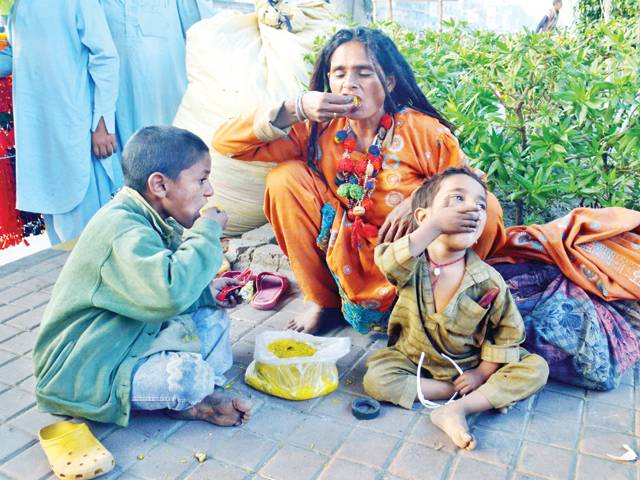LAHORE - Like other parts of the globe, World Health Day was observed across the country including Lahore on Friday with usual rituals of holding seminars, walks and free screening camps.
Like in the past, public access to quality healthcare facilities is still a dream not only in far flung areas but also in big cities like Lahore. Pakistan is still on the bottom amongst countries in the region as far as per capita spending on health is concerned.
What to say of Basic/Rural Health Centres when quality treatment facilities and free medicines are unavailable at tertiary care hospitals and specialised healthcare institutions in big cities where two to three patients are being treated on one bed. Recently, an elderly woman breathed her last on the floor of Jinnah Hospital due to unavailability of bed in the ward.
The World Health Day is celebrated on April 7 every year under different themes to draw people’s attention towards the importance of health. ‘Depression: Let’s Talk’ was this year’s theme of the day
Diabetes, food safety, superbugs - those are just some of the past themes officials picked as World Health Day initiatives. But this year, the World Health Organization is focusing on depression.
“Depression affects people of all ages, from all walks of life, in all countries. It causes mental anguish and impacts on people’s ability to carry out even the simplest everyday tasks, with sometimes devastating consequences for relationships with family and friends and the ability to earn a living,” the WHO wrote on its website.
Apart from other causes, shortage of electricity (load shedding), non-availability of potable water, unemployment, traffic problems, intolerance, insecurity and law and order situation are also the factors behind increase in depression in a country like Pakistan.
According to Pakistan Medical Association, depression is a common and serious medical illness that negatively affects how you feel, the way you think, and how you act. Fortunately, it is treatable.
Depression causes feelings of sadness and/or a loss of interest in activities once enjoyed. It can lead to a variety of emotional and physical problems and can decrease a person’s ability to function at work and at home.
Globally depression affects 20 percent of people while in Pakistan it’s more serious with an estimate of 34 per cent. Both genetic and environmental factors play role in its pathogenesis. Around 35.7 per cent citizens of Karachi are affected with this mental illness, while 43 per cent from Quetta and 53.4 per cent from Lahore are also affected.
There are a number of factors that may increase the chance of depression. Past physical, sexual, or emotional abuse can cause depression later in life; certain medications can increase risk of depression.
Depression may result from personal conflicts or disputes with family members or friends. A family history of depression may increase the risk. Even good events such as starting a new job, graduating, or getting married can lead to depression. So can moving, losing a job or income, getting divorced, or retiring.
Problems such as social isolation due to other mental illnesses or being cast out of a family or social group can lead to depression.
Its symptoms can vary from mild to severe and can include feeling sad or having a depressed mood, loss of interest or pleasure in activities once enjoyed, changes in appetite - weight loss or gain unrelated to dieting, trouble sleeping or sleeping too much, loss of energy or increased fatigue, increase in purposeless physical activity (e.g., hand-wringing or pacing) or slowed movements and speech (actions observable by others), feeling worthless or guilty, difficulty thinking, concentrating or making decisions, thoughts of death or suicide.
As depression is the root cause of many mental disorders and sickness, there is a need to develop an evidence base to aid policy development on tackling anxiety and depressive disorders on a national level in Pakistan.
Moreover, the steps must be taken to overcome the dearth of qualified psychiatrists in the country.
Depression leading to suicide
Talking with people you trust can be a first step towards recovery from depression, Dr Sheheryar Jovindah said in his message on World Health Day. But the best way to cope with it is to consult a psychiatrist, he added.
According to the Consultant Child, Adolescent and Adult Psychiatrist from Shaukat Khanum Memorial Cancer Hospital and Research Centre, common mental disorders are increasing worldwide.
“Between 1990 and 2013, the number of people suffering from depression and/or anxiety increased by nearly 50%. Close to 10% of the world’s population is affected by one or both of these conditions. Depression alone accounts for 10% of years lived with disability globally.
“At worst, depression can lead to suicide, which is now the second leading cause of death among 15-29-year-olds,” Dr Jovindah added.
He further said that depression affects people of all ages, from all walks of life, in all countries.
“It causes mental anguish and impacts on people’s ability to carry out even the simplest everyday tasks, with sometimes devastating consequences for relationships with family and friends and the ability to earn a living.
“In addition, people with depression normally have several of the following symptoms like; loss of energy, change in appetite, sleeping more or less, anxiety, reduced concentration, indecisiveness, restlessness, feelings of worthlessness, guilt, or hopelessness, and thoughts of self-harm or suicide,” he added. Depression increases the risk of other noncommunicable diseases, such as diabetes and cardiovascular disease. In addition, diseases such as diabetes and cardiovascular disease increase the risk of depression Dr Joovindah said lack of treatment for common mental disorders has a high economic cost. “New evidence from a study led by WHO shows that depression and anxiety disorders cost the global economy more than US$ 1 trillion each year, but the most common mental health disorders can be prevented and treated, at relatively low cost.”
“Depression can be effectively prevented and treated. Treatment usually involves either a talking therapy or antidepressant medication or a combination of these,” he concluded






